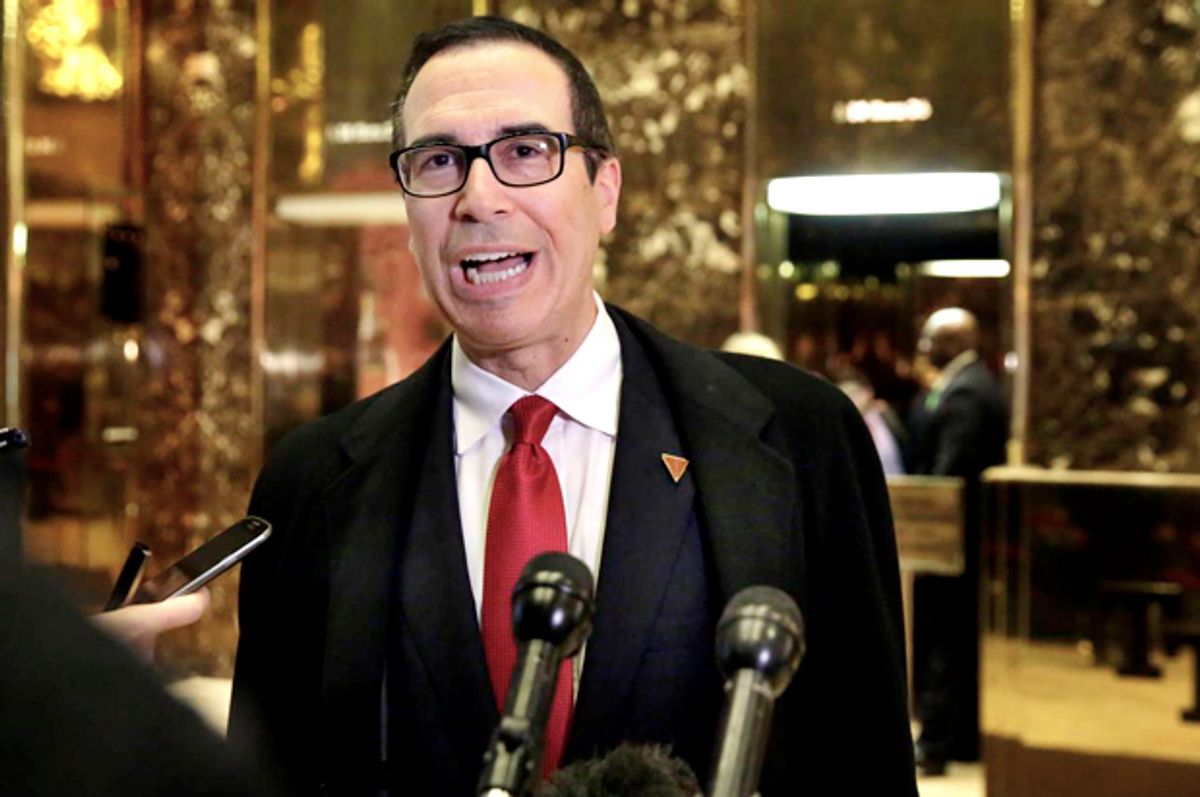Steve Mnuchin, President-elect Donald Trump’s nominee for Treasury secretary, came before the Senate Finance Committee on Thursday to field a series of questions about his background in banking, the many thousands of foreclosures he profited from in the aftermath of the financial crisis and his role as the incoming head of the Treasury Department. It was a rocky interrogation.
Mnuchin was frequently left on the defensive as committee Democrats drilled into his financial holdings and business record. Mnuchin also stepped on his own cause with his fumbling answers on asset disclosure and conflicts of interest — both his own and the president-elect’s.
Shortly before Mnuchin’s hearing was scheduled to begin, news broke that he had failed to disclose his interest in offshore holding companies — and more than $100 million in assets — when filling out his committee questionnaire. Mnuchin updated his forms to reflect those interests and assets, and thus brought on some harsh questioning from Democrats who wanted an explanation for the initial omission.
Mnuchin’s defense basically came down to this: Financial disclosure is hard. “I think, as you can all appreciate, filling out these government forms is quite complicated,” Mnuchin said after Sen. Debbie Stabenow, D-Mich., raised the issue. “The amount of paperwork and filling out the forms, even for me, having experience in business, was quite a job.” Mnuchin went on to explain that he might have erred in trying to get information to the committee too early, and that his lawyer had told him that he didn’t need to disclose certain real estate holdings on the questionnaire. “Any oversight was unintentional,” Mnuchin insisted.
Let’s take Mnuchin at his word and allow that he had simply made a mistake in failing to fully disclose all his assets to the committee. When you have amassed an enormous personal fortune, as Mnuchin has, full accounting and disclosure is no doubt difficult, complicated and painstaking work. The obvious rejoinder to all that is, of course, that running the Treasury Department is also difficult and complicated and requires slogging through a considerable amount of bureaucracy.
But that’s just one problem with Mnuchin’s answer. The other problem came up later in the hearing when Sen. Ben Cardin, D-Md., asked the nominee about how, as Treasury secretary, Mnuchin intends to ensure that “no special breaks” are being given to business entities owned by Donald Trump. “How do you, if confirmed, deal with compliance to the Constitution to make sure that a Trump enterprise is not getting a special treatment?” Cardin asked.
Mnuchin first tried to talk up the laughable measures that Trump and his lawyers have put in place that will supposedly separate the new president from his business interests. When it came to Mnuchin's own role in enforcing that separation, his answer boiled down to saying, Trust me. “I can assure you that in my job of Treasury secretary, whatever responsibilities I have to monitor these issues, which are very important, I can assure you that I will do,” Mnuchin said.
So on one hand, Mnuchin is waving away his failures to disclose all necessary information about his assets by arguing that disclosure is extremely complicated and sometimes errors happen. On the other hand, he’s asking us to trust his capability to police the financial interests of the incoming president, who pointedly refuses to fully disclose the full extent of his holdings and also refuses to divest his shares of his businesses. It’s tough to have confidence that Mnuchin is up for that job when he’s also explaining why $100 million of his own assets were left off his initial disclosures to Congress.
In fairness, Mnuchin isn’t fully to blame for this issue. Trump is the one at fault for putting anyone who serves in his administration in the ridiculous position of having to promise that Trump’s refusal to give up his business won’t precipitate a constitutional crisis. But that’s the inescapable reality of serving at the pleasure of this highly unusual president.



Shares